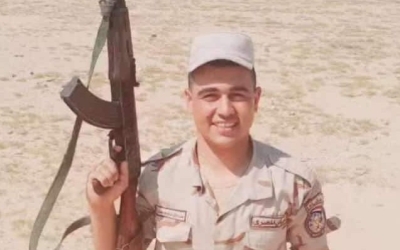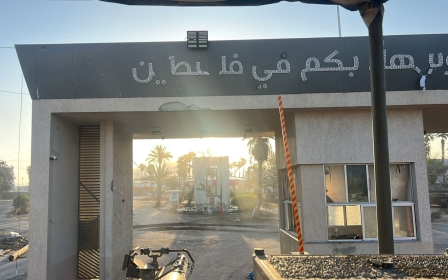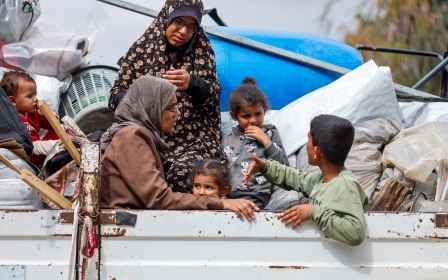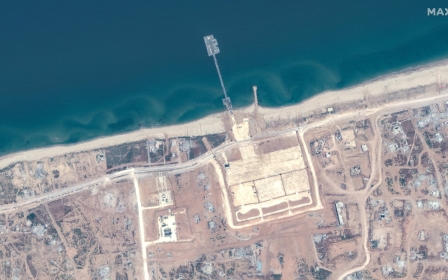Egyptians mourn soldier killed by Israelis at Rafah border amid official silence
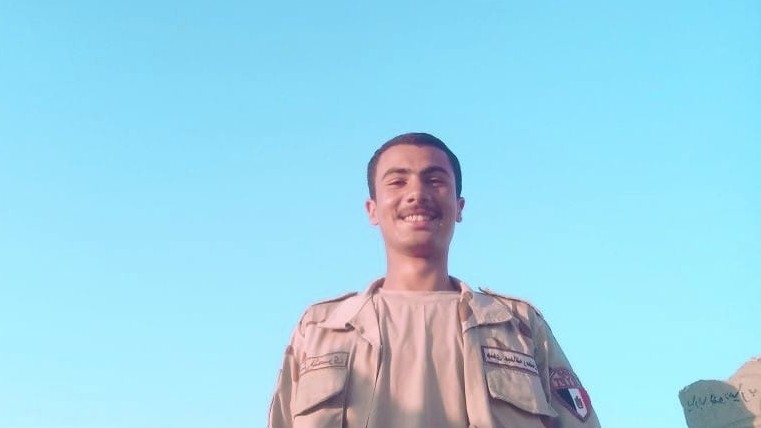
An unofficial funeral was held on Tuesday for one of two Egyptian soldiers killed in a shootout on Monday with Israeli soldiers at the Gaza border with Egypt’s Sinai.
Though the Egyptian military confirmed a "shooting incident" at the Rafah crossing, which Israeli forces overran on 7 May, it has not identified either of the slain soldiers.
However, Middle East Eye has verified the identity of the first soldier as 22-year-old Abdallah Ramadan, a border guard who had been deployed near the crossing and died on Monday. Another soldier, Ibrahim Abdelrazzaq, was confirmed killed on Tuesday after succumbing to his wounds from a shootout incident in the same area, local sources told MEE.
Ramadan’s death has triggered an outpouring of condolences and anger among Egyptians online, with many denouncing the government’s silence about the soldier and lack of clear statements about the shootout.
“We still can not believe that he is gone. The only thing that gives us patience is that he died a martyr defending his country from aggressors,” Ramadan's cousin, Abu Ahmed, told MEE.
New MEE newsletter: Jerusalem Dispatch
Sign up to get the latest insights and analysis on Israel-Palestine, alongside Turkey Unpacked and other MEE newsletters
“After serving his country in the harsh desert and having to withstand the tough nights, he gets killed by the Zionists and he does not even get a military funeral,” Abu Ahmed added.
News of the exchange of fire first broke on Monday in Israeli media, with reports initially censored then confirmed later by the Israeli military, which stated that "a shooting incident" took place on the Egyptian border and that it was under investigation.
Later on Monday, Egypt's army spokesperson confirmed one "element tasked with border security" was killed in a shooting incident and said investigation was underway.
No other official statements were made about the incident, and the army has not publicly revealed the identity of the soldier.
People gathered in a village in Fayyum, 110 kilometres south of Cairo, on Tuesday, for the funeral of an Egyptian border guard killed in a shootout with Israeli forces at the Rafah crossing. pic.twitter.com/LEwbXs20JA
— Middle East Eye (@MiddleEastEye) May 28, 2024
Though it is unclear how the shootout began or who fired the first shot, Daily News Egypt, an independent English-language Egyptian newspaper, cited unnamed sources as saying Egyptian soldiers were "affected" by the Rafah massacre on Sunday, in which an Israeli bombing led to the killing of 45 Palestinians at a displacement camp.
Ramadan's Facebook account has been widely shared since Monday, with many highlighting his last post in which he wrote a prayer for Gaza.
"Oh God, total peace for Gaza," the post, dated 7 February, read.
In an earlier post, he wrote: "My heart is in pain, my eyes full of tears, and Gaza is close, but the world is deaf, mute, blind... Silence is an expression of helplessness."
Ramadan graduated from college in Fayium and was conscripted for two years as a border guard in North Sinai, his family and friends said.
“He was supposed to start the procedure to become a civilian again in August and be released to reserve in September,” Samir Abu Atwa, who attended the same college as Ramadan, told MEE.
“He was religious and liked football," Abu Atwa added.
"In his last holiday from service, he told us about the bombing victims and families from Gaza who cross through the border to Egypt.”
Ramadan was planning to get married after finishing his service, added Abu Atwa.
'He was one of us'
Ramadan's funeral was attended by family and friends, in the absence of any senior military officers. It was held in his home village of al-Ajamiyyin, near Fayium, 110km south of Cairo.
“It was a horrible situation that we knew about his death from Facebook and not from an official messenger or the conscription office in the city," Ramadan's counsin told MEE.
He said that only an army major and police colonel from the Fayium security directorate attended the funeral.
“It is painful for us that he was not honoured, but our tradition in the village is that honouring the dead is delivering them to their last place of rest,” Abu Ahmed said.
'It is painful for us that he was not honoured, but our tradition in the village is that honouring the dead is delivering them to their last place of rest'
- Abu Ahmed, Ramadan's friend
Many people from Ramadan's community and nearby villages gathered to mourn his death.
"We found dozens of people we don’t know and from nearby villages coming to pay respects. Even families who we had some disputes with, came to help us and to make sure we don’t need anything,” Abu Ahmed said.
Several Egyptians on social media criticised the authorities for the lack of transparency and recognition for the slain soldier.
"The martyr, Egyptian soldier Abdallah Ramadan, who was killed by the Zionists on the border in Rafah, was laid to rest amongst the poor of his town in Fayium. No official dog attended the funeral of the martyr of the nation – no governor, no military commander, not even a city council president," wrote Egyptian journalist Gamal Sultan.
"No Egyptian official channel covered his funeral, nor was there an official funeral procession. It's as if he were an unknown victim who died in a motorcycle accident – just one of the elements, as described by the army statement, nameless, without rank, without value, without sanctity, without dignity."
Abu Atwa, Ramadan's friend from college, told MEE that some of the young people attending the funeral tried to chant “generation after generation, we will oppose Israel”, but security officers prevented them. “The security officials told us the burial should be quiet and some people who tried to take videos were prevented.”
Another friend, Omda, told MEE: “Abdallah really liked his military service and was appreciative of what he learned, but he also was tired and wanted these days to be over.
"He was one of us. I cannot say more.”
Anonymous statements
Egyptian media, including state-linked outlets, only cited anonymous sources making vague statements about the incident.
"An official security source said that Egypt has warned of the repercussions of the Israeli operations in the Philadelphi Corridor and warns against harming its elements," the intelligence-linked Al Qahera News reported late on Monday.
The 1979 peace treaty between Egypt and Israel, as well as a 2005 border agreement, limit Israel's military presence along the 100-metre wide, 14 km long buffer zone known as the Philadelphi Corridor.
"This is what Egypt has warned against for months; the Israeli attack on the Philadelphi Corridor creates field and psychological conditions difficult to control and are expected to escalate," the security source was quoted as saying.
Israel’s control of the crossing for the first time since its disengagement from Gaza in 2005 has triggered a rare diplomatic spat with Egypt, which has so far refused to open it from its side of the border, saying it was a Palestinian-Egyptian terminal and should remain as such.
The crossing had been the main gateway for vital aid and for civilians since the beginning of the Israeli war on Gaza in October.
It was controlled by Hamas on the Palestinian side and Egypt on the Sinai side between 2007 and the Israeli incursion on 7 May. Movement via the crossing, however, was also monitored by Israel, Gaza's occupying power under international law, in coordination with Egypt.
Middle East Eye delivers independent and unrivalled coverage and analysis of the Middle East, North Africa and beyond. To learn more about republishing this content and the associated fees, please fill out this form. More about MEE can be found here.


